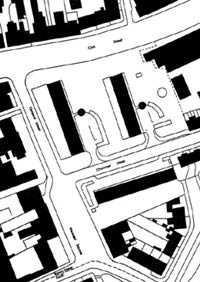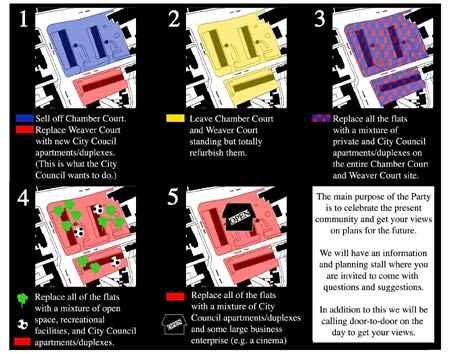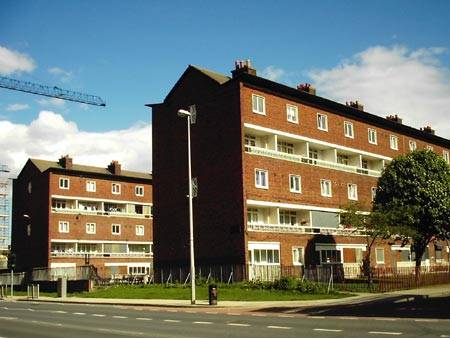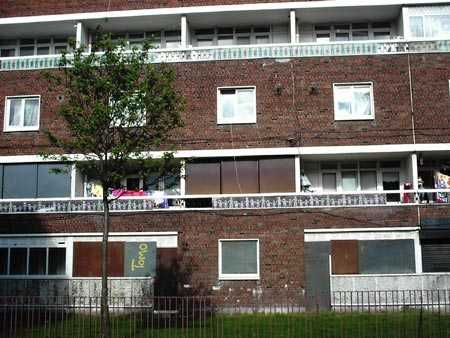|
Blog Feeds
Anti-Empire
The SakerA bird's eye view of the vineyard
Public InquiryInterested in maladministration. Estd. 2005
Human Rights in IrelandPromoting Human Rights in Ireland |
The Sale of the Century continues in Dublin 8... dublin |
housing |
feature dublin |
housing |
feature
 Monday May 09, 2005 15:52 Monday May 09, 2005 15:52 by kevin - (with help from the Chamber Court and Weaver Court Redevelopment Group) by kevin - (with help from the Chamber Court and Weaver Court Redevelopment Group)
 What is happening in Chamber Court and Weaver Court? Dublin City Council continues to sell off its public housing stock...
Dublin City Council appears to be pursuing a policy with Chamber Court that mirrors that of the redevelopment of St. Michael's Estate in Inchicore. In St. Michael's Estate, the Council deliberately left many decent housing units vacant in an attempt to run down the estate, so the remaining familiies would leave and hence the land could be redeveloped under a PPP (Public-Private Partnership) scheme. Rita Fagan, a community activist in St Michael's said "they run the flats down on purpose. The necessary maintenance isn’t done. People find it very hard to live and want to move out." This is part of a wider strategy across the city where the Council is selling off its housing stock, and where possible taking existing public housing and redeveloping it, but with as much private housing squeezed into the space as possible.
Looking around Chamber Court and Weaver Court, you can see that many of the units have the steel panels up over the windows and doors, despite the fact that the buildings are in good condition, and the surroundings are well maintained. Residents of the two complexes recently held an awareness-raising day to try and get people involved in the decision making process that will ultimately affect the future of where they live. They are trying to encourage the remaining families to become active in the campaign to ensure that the wishes of the local community are respected. The residents handed out a leaflet which outlined the current situation: "Dublin City Council is now proposing to sell off the Chamber Court site to private developers, and to use the money from the sale to replace Weaver Court with City Council housing (apartments and/or duplexes). In this case, the Weaver Court site would consist entirely of City Council units. On the Chamber Court site, 70% would be private apartments and 30% would be affordable housing. In the meantime the Council is also planning to build 45 apartments and duplexes at the 'Timber Yard' site, between the new Cork Street extension and Brabazon Street. Residents of Chamber and Weaver Court will have 'first option' on homes in the 'Timber Yard' development. We would now like every resident of Chamber and Weaver Court to tell us which of the options [see graphic below] they would like us to try to get the City Council to agree to. We need to know your opinion, otherwise we do not know how to respond to Dublin City Council." At the moment, the residents are getting advice from an independent architect, and are meeting regularly to discuss the situation. At the information day however, some expressed dissatisfaction with the current process of consultation with Dublin City Council, saying that the Council was merely giving an illusion/simulation of residents involvement with the planning stages; in reality it was more a token gesture than anything else - the Council were simply informing the residents of what was going to happen, regardless of their wishes. This tactic was raised by John Bissett of St. Michael's Estate at a meeting of housing activists late last year, ranking under Placation, Consultation, or Informing in the 'Tokenism' range of citizen participation. According to Sherry Arnstein's "Ladder of Citizen Participation", this tokenistic level of consultation "can be a legitimate step toward their [the community's] full participation. But if consulting them is not combined with other modes of participation, this rung of the ladder is still a sham since it offers no assurance that citizen concerns and ideas will be taken into account. The most frequent methods used for consulting people are attitude surveys, neighborhood meetings, and public hearings. When powerholders restrict the input of citizens' ideas solely to this level, participation remains just a window-dressing ritual. People are primarily perceived as statistical abstractions, and participation is measured by how many come to meetings, take brochures home, or answer a questionnaire. What citizens achieve in all this activity is that they have "participated in participation." And what powerholders achieve is the evidence that they have gone through the required motions of involving "those people"." Residents of Chamber and Weaver Court were unhappy with the development of private gated apartments on the site, believing that this would only contribute to existing levels of division between long term residents of the area (many of whom are living in low-density public housing) and new arrivals. They also felt that the continuing privatisation of Council homes and land meant that in the long term there will be no social housing available in the area for those that need it most.
|























 Chamber Court and Weaver Court is a small development of flats owned by Dublin City Council, just off Cork Street in the Coombe area of Dublin's south inner city. There are three blocks altogether, with approximately 60 units occupied at present. The two blocks lying perpendicular and fronting out onto Cork Street are known as Chamber Court, and the single block to the south of Chamber Street is Weaver Court. At present the Dublin 8 area is undergoing large regeneration, similar to that which is happening in Smithfield in Dublin 7, with the construction of large blocks of private apartments, with large price tags to match. The area had been neglected for many years and was considered an undesirable part of town, but is now being capitalised on by private developers for its proximity to the city centre.
Chamber Court and Weaver Court is a small development of flats owned by Dublin City Council, just off Cork Street in the Coombe area of Dublin's south inner city. There are three blocks altogether, with approximately 60 units occupied at present. The two blocks lying perpendicular and fronting out onto Cork Street are known as Chamber Court, and the single block to the south of Chamber Street is Weaver Court. At present the Dublin 8 area is undergoing large regeneration, similar to that which is happening in Smithfield in Dublin 7, with the construction of large blocks of private apartments, with large price tags to match. The area had been neglected for many years and was considered an undesirable part of town, but is now being capitalised on by private developers for its proximity to the city centre.




 printable version
printable version

 Digg this
Digg this del.icio.us
del.icio.us Furl
Furl Reddit
Reddit Technorati
Technorati Facebook
Facebook Gab
Gab Twitter
Twitter
View Comments Titles Only
save preference
Comments (18 of 18)
Jump To Comment: 1 2 3 4 5 6 7 8 9 10 11 12 13 14 15 16 17 18Some more images from around the immediate area.
Weaver Court.
The Guild - "exclusive" office development up the road.
South Gate apartments next to Chamber Court.
Ardee Court apartments under construction nearby.
The Timber Yard - possible site for construction of new council homes.
...how something like an RTS and a small bit of paint on a statue, or the SWP calling a meeting under a different name, can provoke a maelstrom of comments from the readers and contributors of this site, while the issue of the state destroying working class communities (quite possibly the poorest people in the city in some cases) with dereliction and forced privatisation of their homes from above merits almost zero response...
contraversy = lots of responses.
Excellent news if more Council housing is being privatised. People who own their own homes are more likely to look after them. They are also less likely to tolerate vandalism and graffitti being scrawled on their property. Ireland has one of the highest rates of home ownership in the world, almost 85 per cent. Home owners are also far less likely to vote for loony left parties. They are more likely to put a premium on economic stability when deciding how to vote, as they then have a vested interest in not seeing a property crash. No country with home ownership of over 80 per cent has ever elected a socialist government. Let's try and aim for 100 per cent home ownership in Ireland. We are 85 per cent of the way there allready.
John, you are, as usual, talking out of your arse. For a start the percentage of owner occupiers has been decreasing for a number of years and is about 80% now. So, your entire 'theory' (to give whatever strange things happen inside your cranium an unduly kind name) is contradicted by the evidence.
Secondly, you somehow fail to address the blindingly obvious point that when council housing is privatised, the occupants don't suddenly become owners of private accomodation. The small matter of several hundred thousand euros tends to get in the way.
From census figures the proportion of houses in Ireland that are rented, from both private developers and local councils, was 24.7% in 1961, 20.9% in 1981 and 17.9% in 2002., clearly a downward trend. The rest are either owner-occupied or, in a small number of cases (3% or 4%), owned by the parents of the person living in them. However, as rented houses typically contain fewer people, often being rented by young single people while saving to purchase their first house, the proportion of the population living in rented houses was a paltry 16.3% in 2002 (again from 2002 census), a significant proportion of whom are renting temporarily, either because they are foreigners on secondment to Ireland or are young people/students saving to purchase their first house. The propotion of the population who live all their lives in rented accomodation, and who are therefore voting fodder for left-wing parties, is diminishing by the year. Almost half of home-owners have their mortgage paid off, so are effectively living in free accomodation. Houses last a hundred years, but mortgage repayments last 20 to 25 years. Following the housing boom of the past decade a whole generation of young people will inherit top-quality houses for which they will never have to pay a cent. All this has profound poltical implications. People who own property are far less likely to vote for left-wing parties, they are far more likely to vote for parties that guarantee economic stability, low interest rates and no property crash. This low level of people living in rented accomodation is one of the reasons why the Left vote has always been far lower in Ireland than in other countries and why it is lower in Ireland today than it was a generation ago. Why don't you try and do some socio-economic analysis of why the Left vote in Ireland is so low instead of blaming it on the media, the Civil War, the Catholic Church or whoever? I'm trying to help you by providing such analysis for you, but you don't seem very grateful. The high level of property ownership in Ireland is simply not compatible with the socialist revolution you crave. Face that fact and you'll not waste your life trying to foment one.
"Home ownership in Ireland remains very high with over 75% of private dwellings in the State being owner occupied in 2003." - source
"However, this trend is somewhat reversing at present due to the recent escalation in house prices that may have had the effect of making home ownership less and less attainable for many. The numbers of people on waiting lists for social housing has risen accordingly as many people cannot access secure, affordable rental accommodation.
Despite record private housing outputs, one of the effects of this development in the home ownership market is the increasing numbers of people on the waiting lists of Local Authorities throughout the country. The information compiled in the housing needs assessment of 2002 indicates that at 28 March 2002, 48,413 households were in need of social housing. This shows an increase of 23.5% since 1999 when the total was 39,176 households. Of all households included in the assessment single persons account for 32% and 29% are households with one adult and one child.
Reflecting the continued increase in house prices and of rents in the private sector, problems with housing affordability continues to rise significantly accounting for 44% of households included on the waiting list compared with 34% in 1999. " - source
I don't know what you are trying to prove. Your first source is a CSO publication, called Statistical Bulletin 2004. You've simply quoted from one of their bullet headings which states that home ownership is over 75%. Note it says 'is OVER 75%', not 'is 75%'. Why don't you go and look at the exact figures later down in the same publication (chapter 17) and get your calculator out. You'll find it gives the following for 2003: 75.5% home owners, 16.1% rented, and 7.2% not stated. In other words, the 75.5% figure is when the 7.2% who couldn't be bothered to answer the question are included. Clearly, as with any sampling technique, those who did not bother to respond must be excluded, as they had to live in one or the other, even if they couldn't be bothered to fill in the CSO form. Excluding the 7.2% who did not respond gives approximately 82.5% home owners and 17.5% rented. Your other source is a publication by the Irish Council for Social Housing organisation. A bit left-wing, but never mind. On its first page it gives a graphic showing home ownership in Ireland and other countries in 2000. Ireland is far ahead of the others - the graphic shows, like the CSO, home ownership of 82%-83% in Ireland and around 50% in the other countries. That is exactly the point I was making. The home-owner proportion is far higher and the rented sector far smaller in Ireland than in other countries. To my mind, that's great. It's one of the reasons we never vote in a left-wing government in Ireland, with beneficial results for growth and employment. More evidence of that came out at 11am today with the latest CSO unemployment figures: unemployment has plunged again in April, down to 4.2%. In most of the countries of Europe with left-wing governments its around 10%. The claim that home ownership in Ireland is falling is not supported by any statistics - it has simply been made by the Irish Council for Social Housing, they give no evidence whatever to support it. The most recent figures for home ownership in Ireland are those in Statistical Bulletin 2004, which I quoted above. If you have more up-to-date figures, kindly give your source, not simply quote propaganda from left-wing organisations.
When the census reports "ownership" are they outright owners or are they paying off a mortgage. Any figures on the difference between the 1960's and now for that?
That home ownership is in decline, while 'privatisation' is on the increase. The increase in home ownership did not happen at the same time as the increase in privatisation.
Your theories about home ownership and socialist votes are both completely irrelevant to anything here and also tin foil hat material.
Its not in decline. According to the Statistical Bulletin 2004, which you yourself referenced in your previous post, the number of home owners was 960 thousand in 1998 and 1043 thousand in 2003. Last time I checked, 1043 was greater than 960. Even that understates it. In the two surveys, 57 thousand gave no reply in 1998 and 99 thousand gave no reply in 2003. I'm sure a high proportion of the extra 42 thousand were also home owners.
1. Where did you get those figures from (ie which section/table)?
2. Those statistics say nothing about trends. You have to factor in both the increase in population and the, relatively sharp decline in the average number of people per housing unit.
3. The percentage of people living as owner-occupiers has been in decline for a number of years.
Yes, they are in chapter 17 of Statistical Bulletin 2004. In Table 17.8, to be precise.
"Following the housing boom of the past decade a whole generation of young people will inherit top-quality houses for which they will never have to pay a cent. All this has profound poltical implications. People who own property are far less likely to vote for left-wing parties, they are far more likely to vote for parties that guarantee economic stability, low interest rates and no property crash".
By that rationale if people who are under economic pressure to keep a home do not vote left, then there's a shed load of kids in the next generation who might well do after they've inherited mommie/daddies property and don't have to pay a cent.
You are right John that people will always vote for parties that promise/provide economic stability, it's perfectly natural for us to all want a decent life while we're on this planet. Problem is if your average Joe/Jane was knowledgeable and/or wise then they would know that their comfortable existence/ecomonic stability isn't without it's (moral) costs. Take our farming 'industry' for example. I don't need to say anything on that whole sham...
So long live economic stability usually at someone else's expense due to wholly unfair international trade rules. We shouldn't really care because, well, we don't have the time to do we. Of course we don't. Anyhoo nothing lasts forever and when the day comes when the shoe is on the other foot im sure there will be plenty of economically stable people around the world (Chinese,Indians?) making a ruckus trying to help us poor auld beggared irish.
p.s. i love the way most people's line of argument, depth of analysis always ends with economics. individuals fundamental inability to think never ceases to amaze me. you almost get to the whole point but not quite i.e. when are we going to seriously start asking if the "economy" is the single most important thing humanity should be concerned with. Until we properly and readily address that question people's line of argument always boils down to the same old thing.....
"We must rapidly begin the shift from a thing-oriented society to a person-oriented society. When machines and computers, profit motives and property rights, are considered more important than people, the giant triplets of racism, extreme materialism, and militarism are incapable of being conquered." Dr Martin Luther King
dublin city stuff (vids, audio, photos) c/o IMC-Éire Kev at link below
there will be an event in chamber court at 3 on saturday to attempt to further grasp what is going on, a communicatin action of sorts
all help appreciated
turn up and support, offer views, photo film radio work, talk with people, link communities
there was a previous "carnival" a few weeks back, more later
thumping tunes could be heard as far down as tenters pub.
sat 23rd april
this was a carnival set up by the residents association in an attempt to facilitate debate amongst the community living in the flats who are facing the flats closure due to PPP "development"
artists working with the after schools club took part; face painting, film making, people sketching.
there was talk of a bouncy castle but that didnt happen.
the court has been earmarked for development including a 16 story housing tower, not sure at what stage this is with planning etc.
the residents feel their concerns were not taken in and that there was only token community discussion at begining.
an architect, dont have her name at hand now, came on board in attempt to try to propose an alternative from the community and the carnival was part of that communication mechanism.
there was a table there on the day with the 4 possible outcomes of the flats stuck to it, but there seemed to have been little discussion happening about the future of the area.
tomorow is another art action: a human wall will be made in the court, it is to outline the need for individuals to be responsible for their own development
other related material:
community art exhibition @ marrowbone lane (off cork street)
National College Art and Design Public Art Placement Programme in the Community 2005
http://www.indymedia.ie/newswire.php?story_id=69559
future for weaver court is?
m and m do their work
costume show in 10 minutes
contact artist for further details
not sure if event will be recorded, hope so, if so it will be possible to listen to it later here
art talk about "development", can art make a difference???
2pm Friday - where is NCAD? And where is the talk on, e.g. floor, room number, etc? I may be able to record it, maybe maybe maybe maybe...